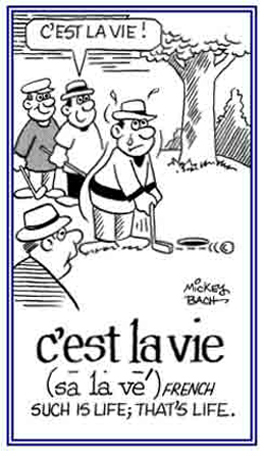Words of French origin
(Many words from French are used in English)
2. Etymology: from French "cheap, inexpensive."
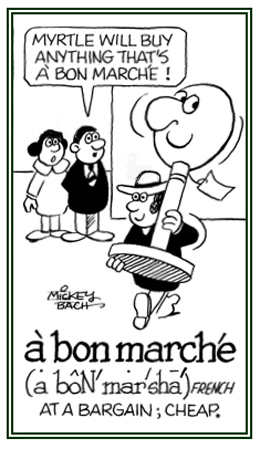
Go to this Word A Day Revisited Index
for a list of additional Mickey Bach illustrations.
2. The language of a particular group which is associated with similar activities; for example, the language of street gangs or criminals: Before the fight started, the mobs were yelling out their peculiar argots, or special slang terms, to communicate with their fellow mob members as a kind of code.
The teenagers were confusing their teachers by using special argots in their written reports.
The British have their argots and Americans usually have completely different argots which often result in a lack of understanding of the argots of the two cultures.
Sometimes it can be very difficult to understand the various argots of scientists, lawyers, and even medical professionals.
3. Etymology: about 1860, from French argot, "the jargon of Paris rogues and thieves"; earlier "the company of beggars"; from Middle French (the French language as written and spoken about 1400 to 1600), "a group of beggars", otherwise, the origin of the term is unknown.
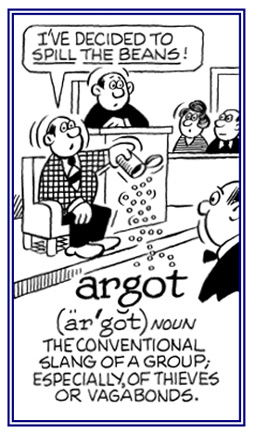
Go to this Word A Day Revisited Index
so you can see more of Mickey Bach's cartoons.
2. Etymology: from French armoire, from Old French armarie, "cupboard, bookcase, reliquary (a place where religious relics are stored or displayed; especially, the relics of saints); from Latin armarium, "a closet, a chest, a place for tools".
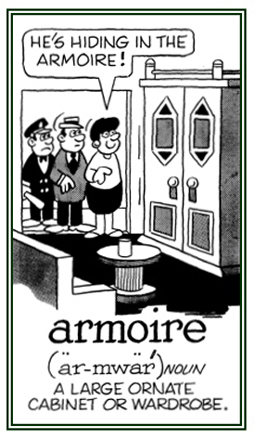
Go to this Word A Day Revisited Index
so you can see more of Mickey Bach's cartoons.
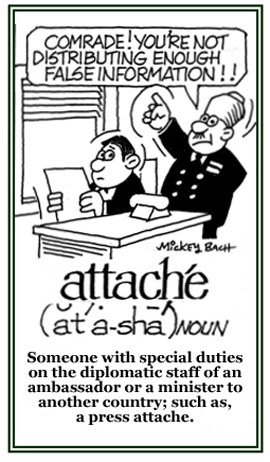
Go to this Word A Day Revisited Index
so you can see more of Mickey Bach's cartoons.
2. An overwhelming, concentrated outpouring, as of words that come quickly and continuously: The man in the audience unleashed a barrage of criticisms and insults at the politician.
The defense attorney subjected the witness to a barrage of questions about what happened during the robbery by the accused man who was on trial.
The reporters fired barrages of questions at the mayor who was accused of being involved with a criminal organization.
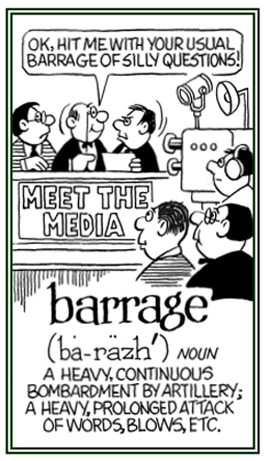
Go to this Word A Day Revisited Index
2. An object of aversion or the dread of one’s existence: Mike considered his job a bete noir because he had to work so hard and received such small wages.
3. Etymology: from French, literally "black beast".
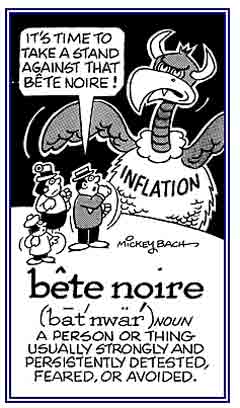
Go to this Word A Day Revisited Index
for a list of additional Mickey Bach illustrations.
2. To suddenly become pale or to turn white: Sam's face blanched at the mention of Shirley's name.
Quentin's face blanched in terror when he suddenly heard the big dog barking at him from behind the fence next to the sidewalk.
3. To grow vegetables, especially celery and endive, in unilluminated conditions in order to whiten the stems and to improve their flavor: The farmer renovated the barn in order to have a darkened area necessary to blanch the crops he had growing there.
4. Etymology: from about 1398, which came from Old French blanchir, "to whiten"; from blanc, "white".
Originally "to remove the hull of (almonds, etc.) by soaking". The sense of "to turn white" is from about 1768.
2. Relating to a lack of concern; nonchalant: Marian has a blasé feeling about housecleaning because she must to do it so often.
Jim was told that there was a possibility that he could lose his job very soon; however, his blasé attitude seemed to indicate that he wouldn't care if it happened.
3. Etymology: from a French word for being satiated or sick with overindulgence.The term, blasé was used frequently in Parisian aristocratic circles during the decade prior to the Revolution of 1789, and for some reason, it was incorporated into English.
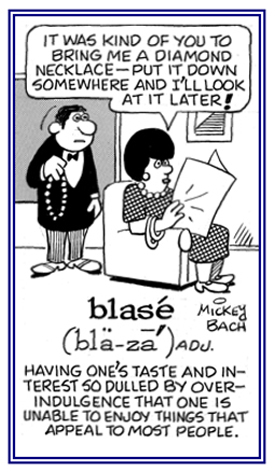

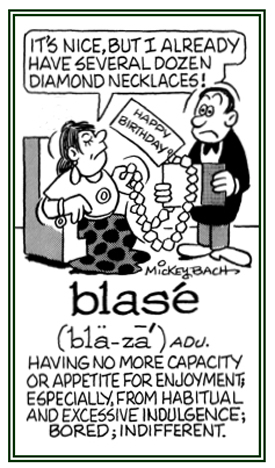
Go to this Word A Day Revisited Index
so you can see more of Mickey Bach's cartoons.
